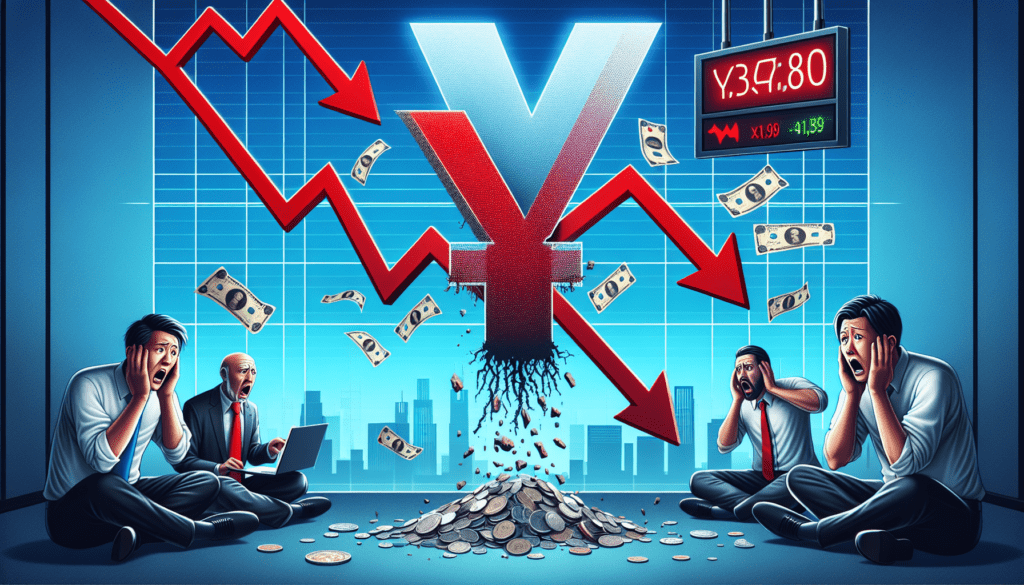“Discover the reasons behind the yen’s recent weakness in global markets and what the future might hold. In this eye-opening video, we delve into the factors that have led to the Japanese currency’s decline, from economic policies to global financial trends. Learn in straightforward, easy-to-understand English what’s causing these shifts and what potential moves could be on the horizon for the yen. If you’re curious about currency dynamics and want insights into what’s next for Japan’s economy, this video is a must-watch. Stay informed and ahead of the curve with our expert analysis.”
The weakening Japanese yen has sparked widespread concern among citizens and politicians alike as they scramble for solutions to stabilize the economy. A significant factor driving this decline is the difference in interest rates between Japan and the United States. Investors are drawn to the higher yields of US bonds compared to Japanese government bonds, leading to a surge in what’s known as a carry trade that further pressures the yen.
However, efforts to intervene in the currency Market have historically proven effective only when backed by improving fundamentals. Recently, the Japanese government indicated a hesitancy to intervene, sending signals to the Market that may have further encouraged the yen’s decline.
Adding to the complexity, the Bank of Japan’s cautious stance on interest rate hikes, despite a recent increase for the first time in 17 years, reflects uncertainty about the country’s economic trajectory. Interestingly, Japan has managed to avoid the inflation spikes seen in other parts of the world, reporting a lower-than-expected inflation rate in Tokyo, which acts against the push for higher inflation expectations.
The options for Japan to counter this trend seem limited. Government spending has not effectively stimulated growth in the past, and while there are signs of positive wage increases, the impact will likely unfold over the next few years. This leaves the dwindling yen in a precarious position without a clear solution in sight.
Globally, a shift in the US dollar’s strength or a decrease in global inflation could narrow the interest rate differentials, offering some relief to the yen. The dynamics of the carry trade indicate that while capital movements are steady now, they could reverse rapidly in times of financial distress, as seen in historical precedents.
On the US side, inflation fears and expectations of further Federal Reserve interest rate hikes are driving the dollar’s strength. However, there’s anticipation that the focus could shift from inflation to growth, potentially changing the Market‘s direction. The US’s current fiscal policies and deficit levels are also factors that could influence the dollar’s future value, with changes likely hinging on future political and economic shifts.
In sum, Japan’s weakening yen presents a complex challenge with no easy solutions. Both internal and external factors play significant roles in the currency’s value, and the situation remains fluid as policymakers and investors watch for signs of change.
Sure, here are five FAQs based on the video about why the yen is weak and what might happen next, using simple spoken English:
1. Why is the yen weak right now?
The yen is weak because Japan’s interest rates are very low compared to other countries, making investing in other currencies more attractive.
2. What makes a currency like the yen become weaker or stronger?
A currency can become weaker or stronger due to changes in interest rates, economic policies, and how investors feel about the country’s economy.
3. What can the Japanese government do to make the yen stronger?
The Japanese government can intervene by selling foreign currencies or buying yen, raise interest rates, or implement policies to boost the economy.
4. How does a weak yen affect people in Japan?
A weak yen makes imports more expensive, which can lead to higher prices for goods in Japan. But it can be good for Japanese exporters because it makes their products cheaper abroad.
5. What might happen next with the yen?
It’s hard to predict exactly, but if Japan’s economy improves or if there are changes in global interest rates, the yen could start to get stronger. However, if current conditions remain the same, the yen might stay weak or even weaken further.






